CHINA AND UNITED STATES
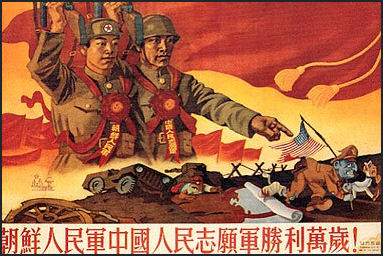
Korean-War-era anti-American poster For the United States, China is a valuable trade partner and rival for influence around the globe and someday may be a formidable military rival as well. According to a report by the Council of Foreign Relations, "China's emergence as a major world power is the single most important challenge to the United States in Asia."
Many scholars believe that the relationship between China and the U.S. may shape the direction the world will take in the 21st century. One of the big uncertainties of the future is whether the rivalry between China and the U.S. will be friendly or acrimonious. John Paton Davies, a China expert at the U.S. State Department in the 1950s, told the New York Times in 1999, "Our infatuation with China — whether it is a potential enemy or a dear friend to be protected and indulged — hasn't changed all that much."
U.S. President Gerald Ford met with Mao in China, in 1975. Chinese leader Deng Xiaoping visited the United States in February 1979.
Articles on INTERNATIONAL RELATIONS AND FOREIGN POLICY factsanddetails.com ; MAO MEETS NIXON Factsanddetails.com/China
American Views of Chinese
Over the decades and centuries, American sentiments towards China have been both negative and positive. While there have been low points like the "Yellow Peril" and Fu Manchu scare in late 19th and early 20th century there has always been a fascination with China as an exotic place where everything was the opposite of what it was in the West.
In the Mao era what was seen as good for the United States was seen as bad for China what was seen as bad for the United States was seen as good for China In the 1950s China was an ally of North Korea and an enemy of the United States in the Korean War. In the 1960s, the U.S. was cast as the No. 1 evil imperialist. In the 1970s, China became a friend of the United States and an ally against the Soviet Union. In the 1980s, China and the United States were budding business partners. In the 1990s, the relationship between the two nations was stormy and erratic and marked by high pints and low points. The same has been true so far in the 2000s.
America is angry with China over its human rights record, economic barriers to American products, the bullying of Taiwan and Hong Kong, policy towards Tibet, large trade deficits, violations of intellectual property rights, and sale of arms to Iran and Pakistan.
In a survey in 2001, 80 percent of Americans said they viewed China as dangerous. The anti-China coalition in the U.S. is an odd mix of conservative former cold warriors, human rights advocates, and Christian conservatives upset by China's abortion policy.
A survey by Zogby poll in 2007 revealed that 52 percent of Americans has a favorable impression of China but 35 percent of Congressional staffers do. And 86 percent of those staffers think wrongly that Americans have a negative view of China.
Polls by the Pew Global Research Center indicate that more Americans still have a generally favorable view of China (49 percent) than those who don't (36 percent). But 47 percent of respondents consider China's growing economy a bad thing and 79 percent see its modernizing military as a threat. On op-ed pages, columnists criticize China for protecting its currency, continuing to jail a Nobel Peace Prize laureate, refusing to embrace stronger sanctions against Iran and angling to obtain Western technology. [Source: John Pomfret, Washington Post, October 29, 2010]
A survey by the Pew Center for People and the Press in December 2009 found that 44 percent of the respondents in the United States said they thought China was the world’s largest economy as opposed to 27 percent that correctly said the United States was. In a Washington Post-ABC News poll conducted in March 2010, more people said the 21st century will be a “Chinese century” than an “American century.” In a similar poll in China, 41 percent of Chinese said that the United States was the world’s leading economic super power but an equal number said that China was, double the number than in 2008.
Most Americans See China as Friendly: Poll in 2012
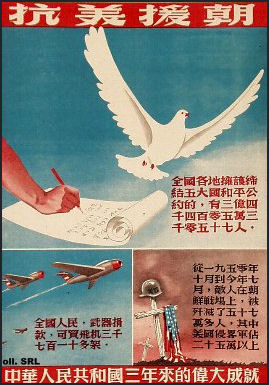
Korean-War-era anti-American poster In February 2012, AFP reported: Despite a slew of disputes, most Americans view China as a friendly nation although they are divided in their general attitude toward the rising power, a poll showed on Tuesday. Major US polling company Gallup, in a survey conducted with the state-run China Daily, found that Americans under age 35 held more favourable views of China and that those who follow news closely were more likely to be critical. [Source: AFP, Published on Feb 15, 2012]
The survey was released as China's Vice President Xi Jinping, who is likely to become the Asian power's next leader, visited Washington for talks that come amid disputes on issues including trade, Syria and human rights.
Some 63 per cent of US adults - and 69 per cent of US 'opinion leaders' from government, think tanks, the media and elsewhere - said that they considered China to be 'friendly, but not an ally.' Some 13 per cent of the general public viewed China as an ally, while 23 per cent said that China was either unfriendly or an enemy.
In a November 2009 CNN poll, 70 percent of Americans said they viewed China as an economic threat. Two thirds said they saw China as a source of unfair competition for American companies and only a quarter viewed China positively as a huge potential market for U.S.-goods. The responses are similar to those voiced about Japan in the 1890s when it was buying Rockefeller Plaza and Pebble beach golf course.
Steven Mufson and John Pomfret wrote in the Washington Post , “The notion that China poses an imminent threat to all aspects of American life reveals more about us than it does about China and its capabilities...In a large part, politicians, activists and commentators push the new Red Scare to advance particular political agendas.” Some see parallels to fears that Americans had about the Japanese economic threat in the 1980s and early 1990s.
China as an American “Scarecrow”?
Keith B. Richburg wrote in the Washington Post, President Obama has regularly mentioned China in speeches, usually to warn that China is out-building, out-investing and out-educating the United States. “Building a world-class transportation system is part of what made us an economic superpower. And now we’re going to sit back and watch China build newer airports and faster railroads?” Obama told a joint session of Congress in September 2011. At the University of Richmond last month, Obama told the students, “You’re competing now against kids in Bangalore and kids in Beijing. . . . Everybody’s got to up their game.” [Source: Keith B. Richburg, Washington Post October 19, 2011]
But most Chinese still see theirs as a developing country, not a superpower on a par with the United States. “I don’t know why Obama takes China as a benchmark,” said said Xu Xiaonian, a professor of economics and finance at the China Europe International Business School in Shanghai. “In research and development, I think we are under-spending.” Sun, the center director in Beijing, agreed. “It’s just Obama’s chicken soup for the American soul,” Sun said. “He just wants to use China as a scarecrow.”
Chinese Attitudes Towards the United States
A poll conducted by the Pew Research Center before the 2008 Olympics found that half of the Chinese interviewed had an unfavorable impression of the United States and a third saw the U.S. as an enemy.
Still, fascination with the United States remains high. 70 percent of all books published in China about other countries area about the United States; 80 percent of middle and high-level government officials who undertake international training do so in the United States; and half of all Chinese surveyed said that U.S.-owned firms were the most influential of all foreign companies in China.
Some insist that many Chinese have a deep respect, attraction love for the United States. Francesco Sisci, chief China correspondent for the Italian newspaper La Stampa, wrote in the Washington Post, “No other country commands so much fascination and love...Most top leaders chose to send their children to study in the United States, not Europe or Japan. [Chinese President] Hu’s son was married in the United States...Deng Xiaoping was proud that he had an American grandchild — born in the United States and thus entitled to an American passport.”
“For many Chinese, America remains the gold standard — even now that China hold $1 trillion of American debt. It’s what China would like to be: rich, powerful and, yes, democratic. It’s all part of the package, many Chinese people think. Globalization, the great phenomenon that is making China rich, isn’t a vague idea here. It has a name: America. Without the United States there would be no globalization, no wealth for China. For that, the Chinese are grateful.”
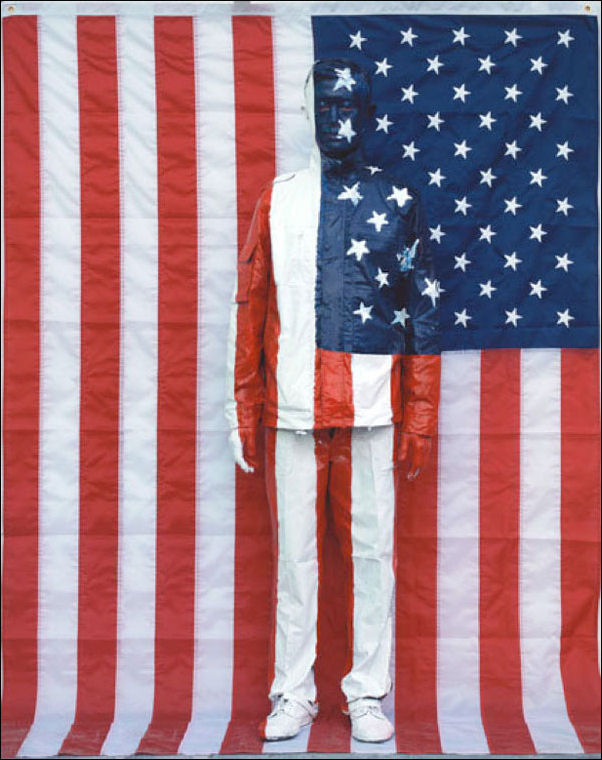
Liu Bolin, China’s Invisible Man artist
and his take on the American flag
Similarities and Difference Between China and America
Howard Friedman wrote in the Huffington Post, “There are obvious parallels between the United States and China. Both countries have high rates of inequality - of the 15 largest economies in the world, the US and China are two of only four countries with a UN Gini index greater than 0.4...Both countries have seen the politically connected reap vast wealth where in the United States some consider lobbyists to have developed into a fourth branch of government... Both countries have aging populations with projected declining support ratios and increasing health care costs. [Source: Huffington Post, Howard Friedman September 5, 2010]
“The two countries are different in countless ways, but let's start with some of the obvious ones. The US is a wealthy country with a GDP per capita of about 10 times that of China. While GDP is an imperfect measure of wealth, any trip to the rural areas of both countries will remind you that we are talking about countries at very different stages of economic development. This economic difference is reflected in the US life expectancy being about 5 years longer and the US literacy rate being about 5 percent higher.”
“The political systems are radically different. The US has a highly imperfect multiparty system with the two main parties looking strikingly similar on many issues, gerrymandering protecting the status quo, low voter turnout, visible election fraud and well-funded lobbyists and think tanks drafting policy and greasing the legislative process. China has a one party system so they have removed the pretense of choice. China has a large number of political prisoners while political dissent is allowed in the United States. United States has the highest reported incarceration rate in the world with about 500,000 sentences associated with drug crimes. The Chinese government has invested massively in public education over the last few decades while public education in the United States has seen a steadily decline in quality and increase in price. With regard to the economic crisis, Nobel Prize winner Joe Stiglitz cited China as having one of the best responses and the US one of the most wasteful.”
“My experiences in China were filled with meeting people passionate about the future greatness of their country. Chinese pride themselves on the Shanghai Expo while you can barely find a mention of it in America. China looks to build great buildings, subways, trains, roads, airplanes and even spaceships to the moon. During my last two visits to Nanjing University, I was struck by how many of the young Chinese feel that anything is possible in China, no aspiration too large...There was a time where Americans had this same confidence and strength of conviction yet it has been lost through infighting, laziness, ignorance, apathy, insularism and the desire for self-preservation.”
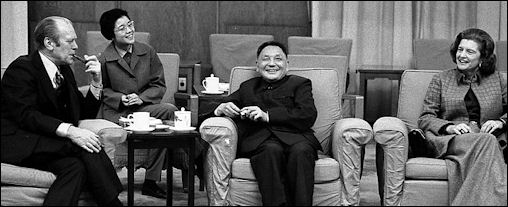
Deng Xiaoping with Gerald and Betty Ford
Chinese Views of Americans
In 1949 China declared that the U.S. was "where reaction, darkness, cruelty, decadence, corruption, debauchery, the oppression of the people by the people, cannibalism and all the evils of whole world today are produced."
For a long time many Chinese thought that most Americans rode on horseback and roped cattle and slavery still existed. Students who study American history in middle school learn that Paul Revere told the peasants the British are coming. The Exhibition of the Crimes of US Imperialists and National Reactionaries museum alleges that Americans introduced tortures such as "putting bamboo slivers under fingernails" to China.
Modern Hong Kong pulp fiction and movies depict America as a place overrun by armed gangs that terrorize innocent Asians. A bestseller in China, Escape from America, is the story of a Chinese man who falls for an American girl and then is arrested for murder after following her to the U.S.
A passage from the university textbook Survey of Britain and America (1994) reads: "Homosexuality is...widely spread. One reason for this may be despair in marriage or love affairs. Some people fail in marriage and become disappointed with it so they decide no longer to love the opposite sex, but instead begin to love a person of the same sex...Another reason may be that some people want to find and do something 'new' and 'curious.'...Through this we can see clearly the spiritual hollowness of these people and distortion of the social order.”
Interviews with ordinary Chinese consistently show that Chinese are patriotic and favor reunification with Taiwan but they have no interest in China become a dominantly power in Asia or kicking the United States out of the region. Most often say all they want s peace and stability and the a chance to seek a better life.
One Chinese student who told Phoenix TV (via Danwei) that he was happy about the 9/11 attacks, which he felt were justified by American hegemonism. Nevertheless, he said, he liked America, was about to go there to study, and did not plan not return to China unless he had no choice. His attitude prompted widespread disgust, though Chinese literature professor Michel Hockx pointed out that he “knows many people who dislike Chinese politics yet like living there!”
Chinese in the United States
See Emigration, Wars, Rebellions, 19th Century History, History
See Chinese Abroad, Minorities in China, Minorities
Chinese Giving Birth in the United States
The pull of the United States remains strong among many Chinese, especially for their children. For $1,475 a pregnant woman can hire a Shanghai-based consulting service to make arrangements for her to give birth in the U.S. so her newborn can receive American citizenship. The service arranges a three-month stay — two months before the birth and one after — in a room with with cable television and wireless Internet for $35 a day. The doctors and staff she see speak Chinese, There are shopping and sightseeing trips. Expectant mothers pay for their own airfare and must get their own U.S. visa, usually a tourist one, but the consultant will help them with paperwork. [Source: Keith Richburg, Washington Post, July 21, 2010]
There are dozens of firms that advertise “birth tourism” packages online. Robert Zhou, who heads the company described above, told the Washington Post, “We don’t encourage moms to break the law...just take advantage of it.” He says that most his clients are from Shanghai, Beijing or Guangzhou and they have no intention of living in the U.S. themselves. Most are fairly affluent. Some have children overseas to skirt one-child rules.
The 14th Amendment of the U.S. Constitution, ratified in 1868, says that anyone born on U.S. soil has the right to U.S. citizenship. The amendment was set up to guarantee citizenship rights to freed black slaves. It was never meat to provide an instant passport the children in the United States to foreigners.
Many Chinese parents say they want American citizenship for their kids for two reasons: 1) education; and 2) the opportunities, lifestyle and nice setting offered by the United States. Zhou told the Washington Post, “Mainland moms believe the U.S. has better education resources. The competition is too fierce on the mainland”. On the U.S., Zhou’s wife, Daisy Cho, said, “It’s spacious with no pollution. We thought it would put us in a good mood looking at the nice scenery, the hills and the water.”
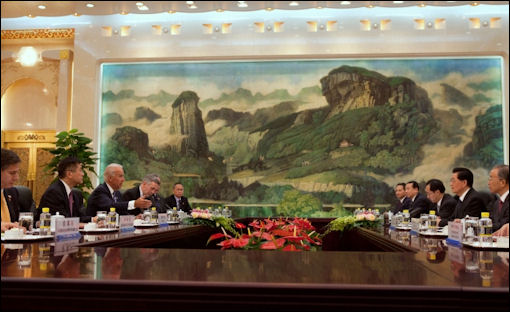
Vice President Joe Biden with Hu Jintao
Chinese High School Students in the U.S.
Calvin Henrick wrote in the Boston Globe, in the fall of 2010 “Medfield High School freshman Katrina Simon and her family hosted an exchange student from China, immersing the young woman in American experiences ranging from apple picking to shopping at the Apple computer store. Now, Simon hopes Melody — the student’s adopted American name — can return the favor and be her guide in China. "After talking to her and learning more about Chinese culture, I thought it was really interesting," Simon said. “I really wanted to go and see it for myself with my own eyes."[Source: Calvin Henrick, Boston Globe, March 20, 2011 , Medfield High School is in the Boston area]
“Medfield’s school district has partnered with a school in Bengbu, a city in China’s Anhui province, for an extensive exchange program. Medfield hosted the school’s principal two years ago, followed by a visit to China by Superintendent Robert Maguire. The next step was an exchange of teachers, with two from Bengbu visiting Medfield while a local teacher spent six weeks at the school in China. Most recently, Medfield hosted two teachers and 10 students, including Melody. Next fall, Medfield will send students to Bengbu, and Simon has applied to be among them. Melody’s family has already agreed to host Simon if she is selected. "She was thrilled that I wanted to come," Simon said.”
Medfield started teaching Mandarin in its high school three years ago, and expanded course offerings into the middle school this year. Educators say a growing number of schools are offering the language. Most of them, 80 or 90 percent, they added it in the past five or 10 years," said Wanli Hu, director of the China Program Center at the University of Massachusetts Boston, which offers conferences for Chinese language teachers. Maguire said the Chinese language instruction is helping to prepare students for an increasingly global workplace. "We’re in a different world," he said. "Making students aware of the rest of the world, having them become cognizant of other languages and cultures, is going to be critical in the future."
“Medfield is one of 60 districts across the country given Confucius Classroom status by the Asia Society, in recognition of exemplary Chinese language and culture programs,” Henrick wrote. “The honor has brought at least $30,000 in grants into the district, with the possibility of more to come. Simon traveled to Washington, D.C., earlier this year for an event focused on school exchange programs, where she met the president’s wife, Michelle Obama, and Medfield’s school district contributed to the official state gift given to the president of China, Hu Jintao, during his visit to the United States.”
Simon said she was surprised to learn how much more Melody knew about American society than she knows about other cultures. Simon was unable to name any Chinese music artists, while Melody was “totally obsessed” with Michael Jackson. And when she asked Melody, a talented singer and dancer, to perform, Simon said, “We thought she would sing a traditional Chinese song, and she sang the “Titanic” song.”
American Students Interested in Chinese
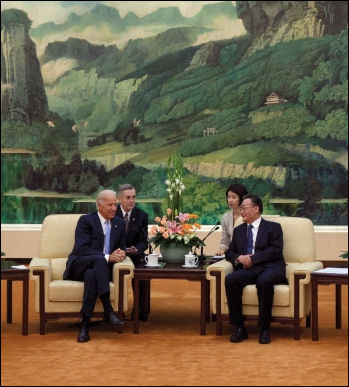
Biden with Wen Jiabao
Calvin Henrick wrote in the Boston Globe, “Students are signing up for Chinese instead of French or Spanish for a variety of reasons, she said. "One boy in the seventh-grade class was really into kung fu, and he just really loves watching Jackie Chan movies," Batts said. "Other parents have told their children, 'This is a new opportunity, it would be great for you to try this.” A lot of those parents understand the global perspective." [Source: Calvin Henrick, Boston Globe, March 20, 2011
“DeSorgher said that, in addition to being potentially useful to students later in life, the Chinese exchange exposes them to diversity, something he said the district otherwise lacks. "With this exchange, it brings in a different culture, a different language, different thought patterns," DeSorgher said.
“Maguire, who adopted the Chinese name Ma Bao Bo when he visited Bengbu, said he hopes his district will eventually be able to offer a full slate of Chinese classes, from middle school through high school. The superintendent said the Chinese program is helping Medfield students make important personal connections across continents.”
Mahuire told a story of sixth-graders participating in a video conference with their Chinese pen pals. One of the Chinese students became especially excited seeing her American counterpart, Maguire said. "The Chinese kid looks at the American girl and says, 'You are so beautiful.' And she looked back and said, “You’re beautiful too,'" Maguire said. "And they’re doing this in front of 100 other sixth-graders "That’s been a very powerful piece for me. They’re getting a fundamental understanding that, as people, they’re not much different from each other."
The U.K. is also boosting the teaching of Mandarin at its schools. In November 2010, the British government announced it would train 1,000 new Chinese language teachers over the next five years,
Anti-Americanism
Anti-American sentiments stirred up by the Korean War helped Mao pursue his radical agenda.
In the late 1980s and early 1990s, the United States was a model and an inspiration for young, educated Chinese, who provided the backbone for the Tiananmen square pro-democracy movement. These days these same young educated people are often the first to express nationalistic and anti-American views.
The anti-American diatribe A China That Can Say No was a bestseller in China. Chapters in the book included "Burn Down Hollywood" and "Don't Fear Declaring, 'Prepare for War,'" and "The Blue Sky Must Die, the Yellow Sky Must Rule."
Bombing of the Chinese Embassy in Yugoslavia in 1999
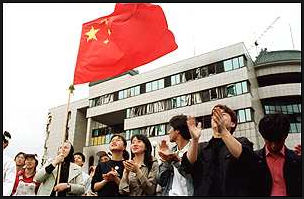
Anti-American protests after bombing
of Chinese embassy in Belgrade
In May 1999, during the War in Kosovo, United States planes, flying under NATO command, struck the Chinese Embassy in Belgrade, Yugoslavia with two laser-guided missiles, killing three people (all journalists) and injuring 27. The United States claimed it was an accident based on faulty intelligence. Many Chinese thought the attack was deliberate. The damage and casualties could have been worse: at least one and maybe two bombs dropped on the embassy didn't explode.
The planes thought their bombs were aimed at the Yugoslav Federal Directorate of Supply and Procurement. The target was selected by the C.I.A. using an out-of-date map (tourist maps available at the time showed the site was occupied by the Chinese embassy, which opened there in 1996). No one bothered to do a ground check even though areal photography showed the building didn't look like a government building.
Most the blame for the mistake was placed on the C.I.A but not all of it. A review team in Washington missed the mistake as did the NATO command structure in Europe. Washington and NATO were also blamed for demanding too many targets in too short of time, putting pressure on military planers to come up with targets. A mid-level officer at the C.I.A. who put "X" on the map was dismissed and six other employees were disciplined.
China described the United States as an evil empire, Clinton was called a fiend and the bombing itself was called a "war crime," "barbaric act" and a "gross violation of international law." One protestor, dressed in Levis and Nikes, at the U.S. Embassy in Beijing said. "We really loved you, you know, but you killed our people."
Anti-American and anti-NATO demonstrations broke out in at least 20 Chinese cities. At Tiananmen Square crowds chanted "Kill the bitch Albright" and "Bill Clinton is a son of a bitch and Tony Blair is the grandson of that bitch." They carried signs that read "Support Yugoslavia and Resist America" and "Adolph Clinton." Twenty Kentucky Fried Chicken outlets were attacked (only one was seriously damaged) and a window was broken at a TGI Friday. Anti-American feelings ran so high, some students said they were going to quit their English classes and rebuke their places in American universities.
Attacks on American Embassies in China
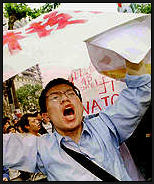
Protests after bombing
of embassy in Belgrade
In Beijing, protesters threw rocks, paint and Molotov cocktails at the U.S. Embassy, formed human wedges to break through police lines, and tried breaking down the reinforced doors with a bicycle rack. Nearly every window was broken.
American ambassador to China James Sasser was trapped for four days in the embassy. He wrote in Newsweek, "The crowds just mushroomed. The police did their best to obey their orders, which were to keep demonstrators outside the compound. But beyond that, it was anything goes. Rocks, Molotov cocktails, paint. The first night I tried to sleep, but all I could hear was the sound of rocks hitting the embassy. I was up all night."
On the second day, "I was told the police lines were in danger of breaking. From the third floor, I saw a sea of people...The Chinese police were making desperate plans for reinforcements — we felt they couldn't hold. We decided to start destroying sensitive documents and sensitive equipment."
The U.S. Consulate in Chengdu was set in fire. A mob rammed the door of the building. American inside called police but they refused to enter the compound for around 40 minutes because they "needed an official letter because it was U.S. government property." After four drafts, the authorities were finally satisfied and police fired tear gas to disperse the crowd,.
The bombing chilled relations between the United States and China for some time. The Chinese refused to let American navy ships dock in Hong Kong. The United States paid $28 million in compensation to China for the bombing of the Chinese embassy in Belgrade, plus $4.5 million in compensations to the injured and the families of those killed. China paid the United States $2.87 million in compensation for damage to U.S., embassies and consulates in China.
American Spy Plane Incident in 2001
On May 2001, tensions escalated again after a U.S. EP-3E Aries II spy plane collided in mid-air with a F-8 Chinese fighter. Each side blamed the other for the mishap. The Chinese plane split in half and crashed. The pilot parachuted out but was never seen again. The U.S. plane nearly crashed but was able to make an emergency landing in Chinese territory on Hainan Island.
The Chinese claim their sovereign airspace extended for 200 miles offshore while most international agreements recognize only 12 miles. After the EP-3E landed the crew was taken into custody. Before they were taken away the crew, using axes, hammers and the their bare hands, was able to destroy about 80 percent of the intelligence value of the plane.
The EP-3E crew of 21 men and three women was kept incommunicado for 60 hours. For the most part they were treated decently. They were kept in Chinese officers' quarters and allowed to socialize with one another during meal times but were harassed and awakened in the middle for interrogation. Many people in the United States, regarded the crew as hostages.
Details of the Planes and Pilots
EP-3E Aries II spy plane is a slow, lumbering plane powered by four propellers. It carries a variety of machines and equipment that are designed to detect of variety if electromagnetic signals: phone calls, radio, satellite and radar transmissions, missile telemetry.
The Chinese pilot, Wang Wei, was regarded by the U.S. military as a reckless "top gun." He frequently buzzed American spy planes and was particularly fond a slipping below American planes and then shooting up in front of them and blasting them with his fighter's afterburners.
Once he scorched the EP-3E's windshields with his engines. Six days before the collision he was photographed only a few meters from the EP-3E's wing holding up a sign with his E-mail address. After the crash he was described in China as a hero. Among his heroic deeds, one Chinese newspaper reported, were being a "meticulous housekeeper" and "persuading his wife, pregnant for the first time, to have an abortion.”
The United States claims the Chinese plane flew under the left wing of EP-3E Aries II and suddenly thrust upwards hitting a propeller with the fighter tail and damaging the spy plane's engine. The fighter then hit the nose cone of the spy plane, sheering it off. A second engines was damaged but flying debris. The Chinese insist the American plane suddenly banked to the left hitting the Chinese plane.
After the collision the EP-3E slipped over on its side, and nearly turned completely upside down, and then plunged 7,500 feet. Even though two engines were knocked out and none of the flaps were working, the pilot was able to gain control of the plane. Explaining how he remained calm, pilot Rodney Young said, "It was if angels had taken hold of the wings,"
As the EP-3E hurled downwards, wind rushed through holes in the fuselage. The crew made Mayday calls, but the noise inside the plane was so loud they were not sure if they were heard, and put on parachutes and prepared for landing in the seas. That proved unnecessary. The EP-3E made a dangerous high-speed landing at the Chinese air base on Hainan Island, the nearest the landing area from where the collision took place.
Resolution of the Spy Plane Incident
The crisis over EP-3 plane was defused through two weeks of diplomacy led by Secretary of State Colin Powell and his deputy Richard Armitrage.
The resolution of the problem took longer than expected because China demanded an apology and the United States refused to give one. Tensions started to ease when the United States backed away from arguments that it had the right to spy on China and began expressing sympathy for the Chinese pilot who died.
The situations was resolved with a "two sorries" letter In China, there are different word for "I'm sorry" and "I apologize" with the meaning of the latter implying a sense of having done something wrong. The letter was written so that the American could read the "sorries: as "sorries and the Chinese could read them as "apologies." The headline in the state-run Beijing Morning Post was "AMERICA FINALLY APOLOGIZED."
The crew was released after 11 days and were welcomed home as national heroes. Spy mission resumed soon afterwards. Washington and Beijing haggled over the return of the plane, which was cut into pieces and loaded into the world's largest cargo plane, then haggled over compensation for "taking care of" and returning the plane. Beijing initially asked for $1 million. Washington Post offered $34,000.
Mishaps at Sea Involving the United States and China
China objects to surveillance operations by U.S. navy ships in waters off China.
In March 2009, the urnarmed U.S. surveillance ship Impeccable was hunting for Chinese submarines in the South China Sea when it was swarmed by Chinese vessels that tried to block it and destroy its sonar equipment. The U.S. navy ship was in international waters in China’s exclusive economic zone in the South China Sea. At one point a Chinese ship came within eight meters of the American ship and strew debris in its path and forced it t slam on its brakes. The American ship responded by turning its fire hoses on one of the Chinese ships. Some analysts described the incident as the most sensitive military confrontation between China and the United States since the spy plane incident in 2001. It occurred just after China and the United States announced they were “considering a naval pact” to avoid accidental confrontations at sea.
In May 2009, a Chinese submarine collided with an underwater sonar apparatus towed by a U.S. navy destroyers in the Yellow Sea. Chinese officials said the collision was an accident. A month earlier a similar collision occurred near Subic Bay off the Philippines. Both incidents ended peacefully when the U.S. ships made it clear they would leave.
It is likely that such incidents will happen gain, given that China and the United States have not worked a protocol on how incidents should be avoided and addressed.
Beijing’s Syria Veto and Anti-Americanism
Beijing has suffered a huge defeat in its longstanding effort to win hearts and minds in the Middle East and Africa with its U.N. Security Council veto of a resolution condemning a government crackdown in Syria. Arab League Chief Nabil Elaraby said China "has lost diplomatic credit in the Arab world" following the move. Leaders of several Middle East countries which are major oil exporters to China have also expressed dismay. And it's not just the elites who are angry. Libyans pelted the Chinese Embassy in Tripoli with stones to show their displeasure with China's ongoing resistance to the Arab Spring. [Source: Willy Lam, Wall Street Journal, February 10, 2012; Lam is an adjunct professor of history at Chinese University of Hong Kong and a select professor of China studies at Akita International University, Japan.]
China doesn't exactly have a reputation for supporting human-rights causes at the U.N., but even so this veto marks surprisingly bad judgment in light of the public-relations costs. How did the Chinese Communist Party, which has thousands of diplomats, intelligence officials and state businessmen based in the Middle East and Africa, get it so wrong? One might have thought someone in Beijing would have learned the lesson of Libya, where they failed to gain the good will of the new government by refusing to cut their links with the Gadhafi regime. Potential contracts in oil and infrastructure worth billions of dollars have now gone to the Europeans and Americans. Unlike Russia, China does not have close military or economic ties with Syria's current regime to worry about.
Beijing's normal rationale for such moves -- its precept of "noninterference in the internal affairs of other countries" -- doesn't fully explain this veto. In the face of overwhelming international condemnation of Syria, Beijing could have upheld this principle simply by abstaining, allowing the resolution to proceed without China's support. Instead, Beijing felt compelled to offer an additional fig leaf to justify the veto. The People's Daily quoted leading foreign affairs expert Ruan Zongze as saying that "China and Russia's decision to veto created a 'window of opportunity' for a soft landing to the problem, which should not be wasted." This willingness to act in a way so far counter to what would appear to be its normal interest is an important signal. Beijing is sending a message about its evolving attitude toward the U.S.
The veto is Beijing's way of thumbing its nose at Washington, which it believes is masterminding a series of "color revolutions" to undermine nondemocratic regimes around the world. Anti-American sentiments seem to have surged within the CCP establishment, particularly after President Obama's recent "pivot to Asia" policy. This is interpreted -- not entirely wrongly -- by Beijing as an exacerbation of what China calls Washington's "anti-China containment policy."
So when U.S. Senator John McCain suggested in an international forum in Munich last weekend that "the Arab Spring is coming to China as well," Chinese Deputy Foreign Minister Zhang Zhijun angrily responded by saying that this was no more than a "fantasy" of the West. But Mr. McCain may have tapped into the fears of some in Beijing. As the Global Times newspaper, a commercial offshoot of the People's Daily, pointed out in an editorial earlier this week, "the 'Arab Spring' has pushed the 'color revolutions' in [countries] in the former Soviet Federation to a climax. . . . The U.S. and EU will continue to foster 'revolutions' in other parts of the world until China is overwhelmed."
All this suggests Beijing is likely to grow more aggressive in challenging the West. Yet the reaction to its Syria veto raises questions about whether it will succeed. The CCP seems oblivious to the fact that many of "the West's" global ideas and principles such as democratic governance are catching on at breakneck speed throughout the Middle East and Africa.
This marks a curious reversal for China. In the 1950s, Maoist China spearheaded a somewhat quixotic campaign to become leader of the Third World by fomenting a Marxist-style international revolution. Thanks partly to the radical chic of Maoism, the Great Helmsmen won quite a number of converts among Africa and the Middle East. Now Mao's heirs have become reactionaries, remaining tone deaf to the democratic aspirations of millions upon millions in the developing world. Beijing might think its Syria vote was a realpolitik win and in the short term that might be true. Over the longer term, though, it may be turn out to be a Pyrrhic victory.
Image Sources: Landsberger Posters http://www.iisg.nl/~landsberger/; BBC; the White House; Wiki Commons, Liu Bolin, China’s Invisible Man artist, Global Times Chinese: photo.huanqiu.com http://photo.huanqiu.com/creativity/unlimited/2010-11/1254288.html
Text Sources: New York Times, Washington Post, Los Angeles Times, Times of London, National Geographic, The New Yorker, Time, Newsweek, Reuters, AP, Lonely Planet Guides, Compton’s Encyclopedia and various books and other publications.
Last updated April 2012
